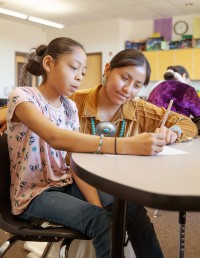NCYL Helps Ensure Supports for Students & Families With Proactive Pandemic Response
As the COVID-19 pandemic inflicted new harms on California students and exacerbated existing inequities within the state’s public school system, the National Center for Youth Law took an active role in supporting students and families and ensuring the protection of their rights.
NCYL’s proactive work to support students and families in this particularly critical time includes:
- The development of a report, “How Districts Planned for Pandemic Learning: Equity-Driven Practices and Lessons Learned from 2020 Learning Continuity and Attendance Plans.” This in-depth report examines the ways that Local Education Agencies (LEAs) in the state prepared to provide services during the pandemic and provides recommendations as to how LEAs can more comprehensively plan to meet the needs of all students, particularly those with unique needs.
- The creation of guidance to assist California families, advocates and school districts in creatively addressing education equity concerns during the pandemic. The guidance includes eight detailed recommendations prepared by NCYL and its partners, and some of the suggestions have been implemented in districts across the state.
- The publication of a “Know Your Rights” Guide, developed in partnership with fellow advocate organizations, aimed at helping families better understand their rights and their school district’s responsibilities regarding distance learning and Independent Study amid the pandemic.
- Helped secure $30 million in California state funding to support students in foster care during the pandemic.
These efforts represent a multi-pronged approach to ensure that the health, safety and voices of youth are centered in the systems that impact them.
Creating resources
The “How Districts Planned for Pandemic Learning” report focuses on students with unique needs, such as those in foster care, in the juvenile justice system, experiencing homelessness, English learners, those in low-income families, and those with disabilities. The COVID-19 pandemic compounded the usual barriers to graduation these students face, such as higher-than-average school mobility, lack of access to mental health and special education services, and discriminatory school climates.
In the report, 48 Learning Continuity Plans were analyzed to learn about promising and concerning practices and trends in LEA planning. The report, developed in partnership with Californians Together, Children Now, and public advocates, includes findings from that research, as well as 20 recommendations for how LEAs can plan more comprehensively for the needs of all students, particularly students with unique needs.
NCYL continued these efforts with its “Elevating Equity” guidance, developed in partnership with the Education Advocacy Clinic at East Bay Community Law Center, a clinic of Berkeley Law School, and Law Foundation of Silicon Valley, Legal Advocates for Children and Youth. The guidance, published in 2020, is aimed at helping California school districts and communities address equity concerns during the pandemic. Among the recommendations in the guidance that have been adopted by school districts:
- Make District COVID-19 Learning Plans Transparent and Accessible for all Families. This includes posting documents online, making documents available in multiple languages, and providing or facilitating access to technology.
- Provide Enrollment/Reentry Opportunities for Vulnerable Youth. This includes ensuring youth reentering the community are promptly enrolled, complying with enrollment provisions for youth in foster care, youth in the juvenile justice system, and youth who are homeless, and ensuring continuity of services when students transfer.
- Ensure Students with Disabilities Receive Needed Services. This includes continuing to provide special education services, creating individualized distance learning plans aligned with students’ special education programs, holding Individualized Education Program (IEP) meetings or postponing only if there is mutual agreement, and convening IEP meetings within 30 days of schools reopening.
- Support Foster Youth with Access to Connection and Instruction. This includes increasing outreach by districts to foster youth and ensuring school stability rights are protected.
- Encourage Compassionate Grading Practices. This includes ensuring no student’s grade is negatively impacted during school closures, and that students have opportunities to improve their prior grades during the pandemic.
The "Know-Your-Rights" Guide — developed with Children Now and ACLU Foundations in California, among others — aims to aid students and families in making informed choices regarding California education options for the 2021-22 school year.
School districts must maintain an eye toward equity for all students, particularly during the COVID-19 pandemic, and NCYL is proud to help in those efforts.
For more on NCYL’s work in helping to secure $30 million in state funding to support the education needs of foster students, click here.






